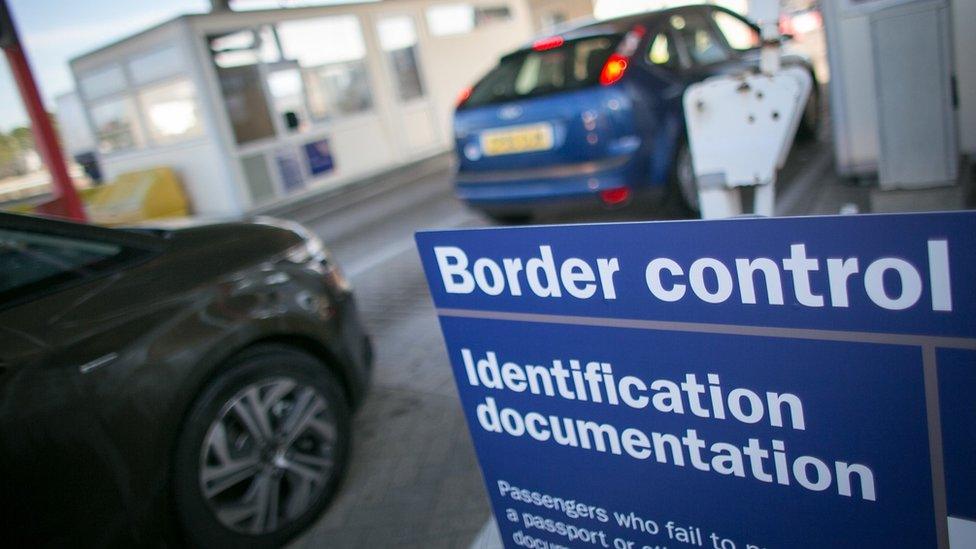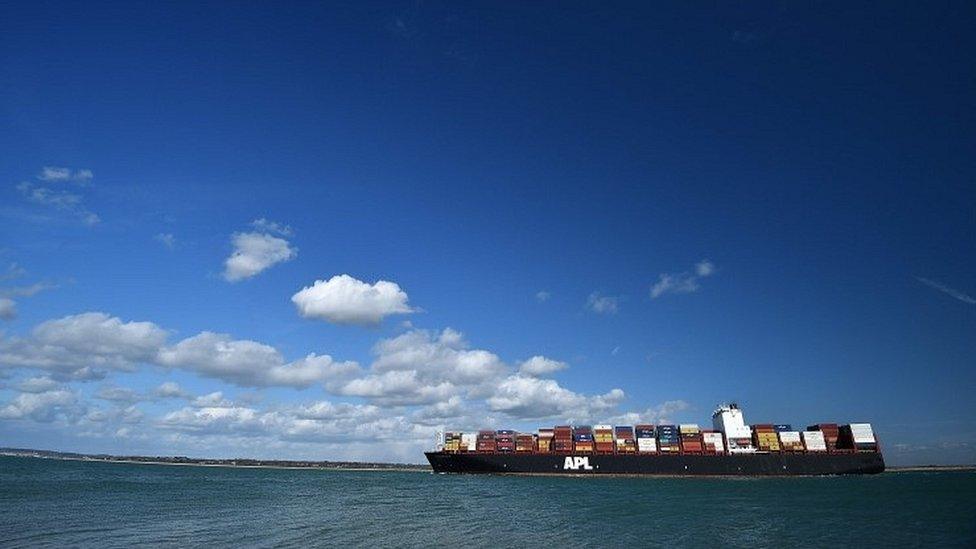Brexit: What is the government's customs union plan?
- Published

The Department for Exiting the European Union has released what it calls a future partnership paper, laying out the government's plans for the UK's relationship with the EU after it leaves.
The Reality Check team looks at some of the key parts of the document, external.

Two options
"The government believes that there are two broad approaches the UK could adopt."
The key part of the government's paper is the choice of two different destinations as it tries to negotiate a long-term solution.
The first is "a highly streamlined customs arrangement", in which the UK leaves the customs union, but comes up with ways of simplifying the future customs regime between the UK and EU countries.
That could include developing technology and negotiating other systems to speed things up at ports. But implementing such a complex scheme would take years of preparation.
The other option proposed is a new customs partnership with the EU, which would do away with a customs border altogether.
Agreeing to such a partnership, which doesn't really exist anywhere in the world, would be quite a concession for the EU as it would give the UK the benefits of being in the customs union while still allowing it to forge trade agreements with non-EU countries, which EU members are not allowed to do.

Interim period
"People and businesses in both the UK and the EU would benefit from an interim period."
The government wants an interim or transition period between the UK leaving the EU and the new permanent customs regime coming into effect.
The paper suggests a time-limited period during which the UK leaves the customs union only to move straight into another temporary customs union with the EU that would operate in pretty much the same way - except, the UK wants to be able to negotiate and sign (but not implement) free trade deals with other countries outside the EU at the same time.

Unilateral but also equivalent
"The UK would aim to negotiate trade facilitations with the EU and implement unilateral improvements to our domestic regime."
"The promotion of the free flow of trade in both directions between the UK and the EU would also require the EU to implement equivalent arrangements at its borders with the UK."
It is not clear which aspects of the streamlined arrangement would be unilateral and which would need agreement.
The paper says, in paragraph 29, that the government would make unilateral improvements to its systems, to speed things up at ports.
But then, in paragraph 30, it says that the EU would have to implement equivalent arrangements.

Common Transit Convention
"Through membership of the Common Transit Convention (CTC), which simplifies border crossing for goods in transit."
The CTC is the set of rules for moving goods between EU member states and other countries, including Iceland, Norway, Switzerland, Macedonia and Serbia.
It is supposed to make it easier to move products from one country to another via a third country that is not necessarily an EU member.
For the UK, the benefit would be that goods could be imported from Asia via the port of Rotterdam, for example, without having to pay EU duties.

Authorised Economic Operators
"Negotiating mutual recognition of Authorised Economic Operators (AEOs), enabling faster clearance of AEOs' goods at the border."
AEOs are an international kitemark that recognises businesses as regular international traders that are solvent and have a good record of paying customs fees and taxes and keeping proper records.
Companies holding the designation are allowed to use certain fast-track systems when going through customs.
The government estimates that 60% of UK imports and 74% of UK exports involve companies with AEO status.

The booze cruise survives?
"Ensure that individuals travelling to the UK from the EU and vice versa can continue to travel with goods for personal use as freely and as smoothly as they do now."
The amount of alcohol and cigarettes that can be brought into the UK from non-EU countries without paying duty is limited - up to four litres of wine and 200 cigarettes.
After Brexit, such limits could return for trips to and from the EU.
But the government is keen to strike an agreement that ensures that does not happen.

Innovative and untested
"We acknowledge this is an innovative and untested approach that would take time to develop and implement."
The government says it wants to look into the "practical complexities" involved in a customs partnership, but the EU has already repeated its argument that frictionless trade outside the Customs Union and the Single Market is impossible.
Would ministers be happier being "innovative and untested" than being courageous, external?

Customs White Paper
"We will continue to discuss these proposals with stakeholders over the summer and will publish a Customs White Paper in advance of the Customs Bill in the autumn."
If negotiations on the future partnership with the EU have not yet begun by the autumn, there may be a few blank spaces in the Customs White Paper that will have to be filled in later.
And this week's paper also emphasises that the government will be ready for a "no deal" scenario that would necessitate "standalone customs and excise systems".
"This is not the government's preferred outcome," the paper says, "but it is essential that the UK is prepared for all possible outcomes."



- Published15 August 2017

- Published14 August 2017